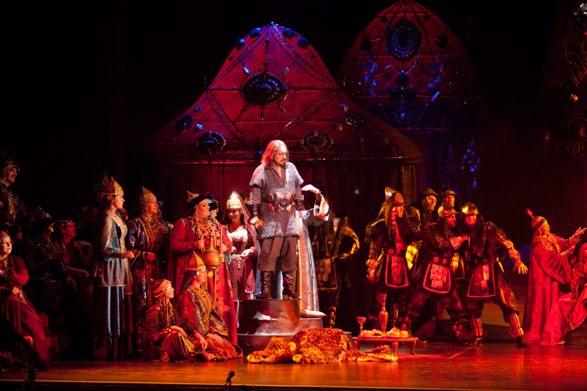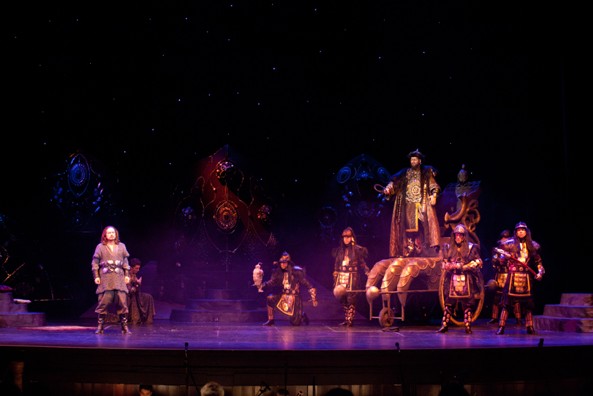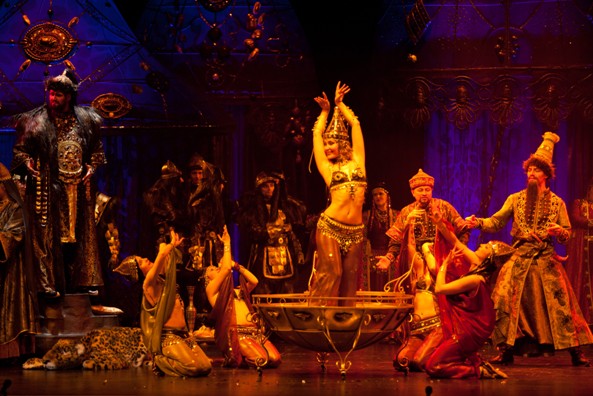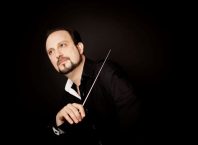In their first visit to Israel, the Kolobov Novaya Opera Theatre of Moscow bring us their production of Borodin’s Prince Igor. It’s one of the prime examples of the Romantic-era Russian canon, but is not so often performed worldwide. This production gives Borodin’s interpretation of the medieval epic an elaborate, lively feel, and shows off a number of excellent singers.

The opera is directed by Yuri Alexandrov, who feels that this production carries a message about Russia today and tomorrow. It is a message of hope – hope in humanity and in a better future. The opera, while it does carry a theme of nationality, focuses more on the lives of the men and women of the plot, and the overall goodness even in the potentially menacing enemy Khan. The production stresses this point, while still employing the grandeur of the choruses, which symbolize the people as a whole.
Borodin himself was a member of The Five, a group of Russian composers who often collaborated on works and ideas. The Five (who were also known as “The Mighty Handful”) were part of the Romantic Nationalist movement in Russia, and themes of Russian history and culture were common in their work (one example is Mussorgsky’s Boris Godunov, which was staged last year at the Israel Opera). Like their predecessors, they were influenced by European ideas about music, but they wanted to create something of their own, something distinctly Russian. Prince Igor is one of the resulting works. Like his symphonic work “In the Steppes of Central Asia”, it uses a palette of Russian melodies and “exotic” elements that characterize the Polovtsy.
The opera opens in the town of Putivl, where Prince Igor is preparing to march against the Polovtsy (a Turkic nomadic people who inhabited the steppes of Eurasia in the Middle Ages). The stage is filled with the people of Russia, and the class system is obvious: peasants, soldiers and boyars, all united only in their singing praises to Igor, his son Vladimir, and to Russia. Suddenly every face on the stage turns to a distant point on the horizon as the sun is hidden in an eclipse. This is a bad omen, the people fear, and they try to persuade their Prince to postpone the attack on Khan Konchak’s camp. However, Igor is adamant. His wife Yaroslavna arrives to wish him well, and after a touching farewell scene he leaves her in the care of her brother, Vladimir, Prince Galitsky.
In the next act, we see Galitsky’s true nature: he is licentious at best, and cruel and unfeeling at worst. If here were crowned Prince of Putivl, he sings, he would enjoy a carefree existence. His people adore him and enjoy the lifestyle he provides, and begin plotting to crown him as their prince in Igor’s absence.
In a dramatic move from Galitsky’s drunken revelry, we now meet Yaroslavna in her quiet palace. She sings of her longing for Igor and worries over his fate. The women of Putivl enter and complain that Galitsky and his men have abducted a young girl. Yaroslavna confronts her brother, but to no avail. As they argue the boyars arrive in Putivl and announce that Igor and Vladimir have been seized by the Polovtsy, who are preparing to attack the town.
In Act II we are transported to the Polovtsian camp, where the girls are sitting around the tents and singing. Konchakovna, the Khan’s daughter, is pining for her lover, who turns out to be Igor’s son Vladimir. They share a tender love scene which is interrupted by Igor, wandering the camp and worrying about his fate, his army and Yaroslavna. A Christian Polovtsian approaches him and offers to help him escape, but he refuses, as it wouldn’t be honorable for a prince to run away.

The Khan arrives, surrounded by his warriors. He offers a hand of friendship to Igor, saying that they are both khans, and therefore equals. He proceeds to show Igor his wealth and power, plying him with alcohol and bringing in troupes of dancers to entertain and tempt the Prince. Slave-girls and warriors fill the stage for the now-famous Polovtsian Dances, praising their victorious Khan.
This image of extravagant celebration swiftly turns to anguish and longing, as the scene moves back to Putivl where Yaroslavna pines for Igor and weeps over the ravaged town. A weary-looking traveler approaches her: it is Igor, who has finally managed to escape captivity. The couple celebrates their reunion in a triumphant love duet, and they are joined by the people of Russia.
One of the most common criticisms about Prince Igor is the apparent lack of any real action. None of the important events mentioned actually happen onstage: there is no intense battle-scene between the Russians and the Polovtsians, Galitsky is never crowned Prince, and Igor’s escape from the Khan’s camp is not explicitly shown. This is mostly because the way the opera was composed: Borodin (who also adapted the libretto from the original Slavic epic) worked on Prince Igor on and off over the course of eighteen years, in addition to his job as a chemist, and it was ultimately left unfinished at the time of his death. The work was completed by his fellow composers Nikolai Rimsky-Korsakov and Alexander Glazunov. The latter composed most of the original penultimate act, in which Igor’s escape is planned and the Vladimir-Konchakovna plotline is detailed, and this act is omitted in some productions.
However, this apparent lack of drama doesn’t minimize the operatic experience. Instead of an action-packed plot, we have a set of scenes, each distinctly different from the others, which portray the characters of the opera perfectly. The love between the two couples is illustrated in fine lyrical duets, and the rowdy Galitsky is portrayed with a kind of grotesque humor. It’s hard not to be moved by the contemplative arias of the four main characters, or to be excited by the Polovtsian Dances.

Russian operas of this genre often feature impressive basso roles, and this opera has two: Galitsky and Konchak. The Kolobov Novaya Opera have brought with them an array of outstanding voices. Special mention should go to Alexander Kisselev, who makes the nasty Galitsky almost likeable during his introductory aria, and then instantly despicable in his interaction with Yaroslavna. Yaroslavna herself, whose role is shared by no less than four fine soprani in this production, seems to be the morally dominant character in this opera, and Borodin gives her some of his most beautiful music – her tender farewell to Igor in Act I, her lament in the last act. As Prince Igor, Andjey Beletsky is a fine, expressive baritone, though a little shaky in several parts. In the role of Konchakovna, sung by a contralto or a mezzo-soprano, Tatyana Tabachuk is particularly wonderful in her Act II cavatina. Alexander Bogdanov’s sweet-sounding tenor was perfectly suited to the role of the amorous Vladimir.
It’s impossible to talk about a production of Prince Igor without mentioning the chorus scenes. The people of Russia and the Polovtsians all dominate the stage during most of the scenes, and the ensembles help characterize the principals: the Russians’ loyalty to Igor attest to his honorable nature despite his defeat, Galitsky’s men emphasize his licentiousness as opposed to Igor and Yaroslavna’s piety, and the Polovtsians’ performance is almost an anthropological display of their nomadic culture. The Kolobov Opera Choir is sublime, both in the all-important role of the Russian people and as the colorful Polovtsians.
Director Yuri Alexandrov and his team make the most of both the stage and singers. The movements of the soloists and chorus seem at times to be perfectly timed with the music. In Act I the stage features an ornate but battle-worn gate that is brought down when the Polovtsy are preparing to enter the Putivl, and the stage is illuminated by an eerie red light which emphasizes the forthcoming battle. Later, in the Polovtsian camp, it is replaced by a background of ornate blue-tinted tents. The intricate costumes, by set and costume designer Vyacheslav Okunev, are out of this world: in Act I they emphasize the difference between the classes, and in Act II the almost magical allure of Konchak’s camp. The stage seems small for a setting of such grandeur, but this helps keep the focus on the individual characters, reminding us that though it deals with events that concern kings and nations, even they are ultimately human.
Enjoy this production to the fullest and attend the pre-performance lectures in the auditorium one hour before the show (free for ticketholders), or meet the soloists at the Opera Talkback sessions right after the show (also free). Get your tickets online or by phone at 03-692-7777.





